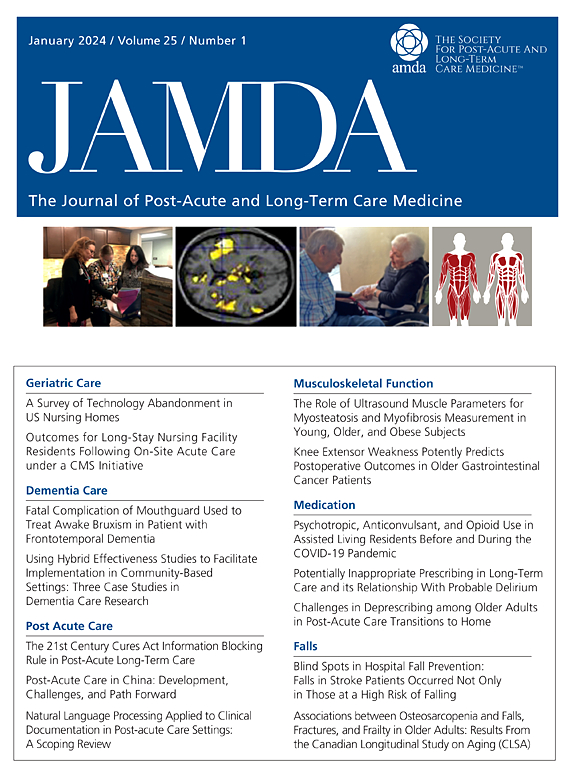镁耗尽评分作为一种新的认知障碍预测指标:来自NHANES的基于人群的横断面研究。
IF 3.8
2区 医学
Q2 GERIATRICS & GERONTOLOGY
Journal of the American Medical Directors Association
Pub Date : 2025-07-25
DOI:10.1016/j.jamda.2025.105776
引用次数: 0
摘要
目的:镁(Mg)缺乏可能加速神经退行性疾病的进展,但目前的认知障碍生物标志物有明显的局限性。本研究旨在探讨镁消耗评分(MDS)与认知功能障碍的关系。设计:本研究采用2011-2014年全国健康与营养调查(NHANES)的数据进行横断面分析,以研究MDS与认知表现之间的关系。环境和参与者:该研究包括2768名来自NHANES数据集的60岁及以上的参与者。其中,650人(23.48%)在老年痴呆症注册协会(CERAD)测试中表现出认知障碍,700人(25.29%)在动物流利性测试中表现出认知障碍,676人(24.42%)在数字符号替代测试(DSST)中表现出认知障碍。方法:采用单变量和多变量logistic回归模型、多变量线性回归模型和亚组分析来评估MDS与认知表现的关系。结果:在所有测试中,较高的MDS评分与认知障碍的几率增加显著相关。多变量线性回归分析显示,MDS与认知功能障碍显著相关,尤其是在CREAD测试中(β, -0.71;95% CI, 1.42-0.00)和DSST (β, -2.78;95% CI, 4.41至-1.15)。相比之下,动物流畅性测试显示出较弱且不一致的关联(β, -0.71;95% ci, 1.48-0.06)。亚组分析显示,MDS与认知障碍之间的关联在久坐不动或膳食镁摄入量≤420 Mg /d的个体中尤为明显。结论和意义:MDS可能是认知障碍的预测因子,久坐不动的生活方式和低膳食镁摄入量加强了这种关联。需要进一步的前瞻性研究来验证这些发现。该研究表明MDS可能是认知能力下降的早期标志,对低镁摄入量或久坐行为的个体进行早期干预具有重要意义。本文章由计算机程序翻译,如有差异,请以英文原文为准。
Magnesium Depletion Score as a Novel Predictor of Cognitive Impairment: A Population-Based Cross-Sectional Study From NHANES
Objective
Magnesium (Mg) deficiency may accelerate neurodegenerative disease progression, but current cognitive impairment biomarkers have significant limitations. This study aimed to investigate the association between Mg depletion score (MDS) and cognitive impairment.
Design
This study is a cross-sectional analysis using data from the 2011–2014 National Health and Nutrition Examination Survey (NHANES) to examine the relationship between MDS and cognitive performance.
Setting and Participants
The study included 2768 participants aged 60 years and older from the NHANES dataset. Among them, 650 participants (23.48%) showed cognitive impairment on the Consortium to Establish a Registry for Alzheimer's Disease (CERAD) test, 700 (25.29%) on the Animal Fluency Test, and 676 (24.42%) on the Digit Symbol Substitution Test (DSST).
Methods
Univariate and multivariate logistic regression models, multivariable linear regression models, and subgroup analyses were conducted to assess the association between MDS and cognitive performance.
Results
Higher MDS scores were significantly associated with increased odds of cognitive impairment across all tests. Multivariable linear regression analysis revealed that MDS was significantly associated with cognitive impairment, particularly on the CREAD test (β, −0.71; 95% CI, 1.42–0.00) and the DSST (β, −2.78; 95% CI, 4.41 to −1.15). In contrast, the Animal Fluency Test demonstrated a weaker and less consistent association (β, −0.71; 95% CI, 1.48–0.06). Subgroup analyses showed that the association between MDS and cognitive impairment was particularly pronounced in individuals who were sedentary or had a dietary Mg intake ≤420 mg/d.
Conclusions and Implications
MDS may serve as a predictor of cognitive impairment, with sedentary lifestyle and low dietary Mg intake strengthening this association. Further prospective studies are required to validate these findings. The study suggests that MDS could be an early marker for cognitive decline, with implications for early intervention in individuals with low Mg intake or sedentary behavior.
求助全文
通过发布文献求助,成功后即可免费获取论文全文。
去求助
来源期刊
CiteScore
11.10
自引率
6.60%
发文量
472
审稿时长
44 days
期刊介绍:
JAMDA, the official journal of AMDA - The Society for Post-Acute and Long-Term Care Medicine, is a leading peer-reviewed publication that offers practical information and research geared towards healthcare professionals in the post-acute and long-term care fields. It is also a valuable resource for policy-makers, organizational leaders, educators, and advocates.
The journal provides essential information for various healthcare professionals such as medical directors, attending physicians, nurses, consultant pharmacists, geriatric psychiatrists, nurse practitioners, physician assistants, physical and occupational therapists, social workers, and others involved in providing, overseeing, and promoting quality

 求助内容:
求助内容: 应助结果提醒方式:
应助结果提醒方式:


